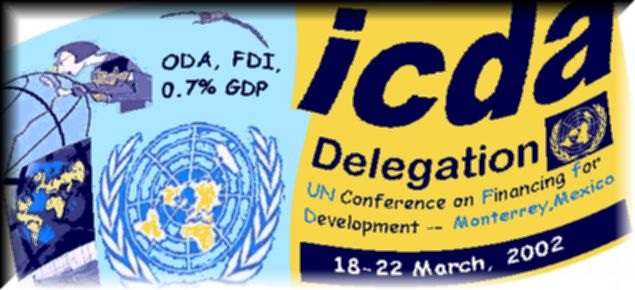
| ICDA LATEST |
ICDA Latest News
| ICDA MEMBERS |
Current Members
| WTO IMPACT LIST |
Subscribe Here
 Talk about the WTOIL!
Talk about the WTOIL!
Password Protected!!
| CENNT |
Latest News
IWGGT (in construction)
| PUBLICATIONS |
Latest ICDA Journal (in construction)
| VACANCIES |
Internship
| HELP |
FAQ's
| SURVEY |

|
ICDA's UN Financing for Development Brief
By Monika Adamova ICDA Secretariat, Brussels 18 March, 2002 · Will take place in Monterrey (Mexico) from 18th March till 22nd March 2002 · Governments, international financial institutions, business sector and NGOs will meet to decide upon the strategies on how to reach the internationally agreed development goals as set by the UN Millennium Declaration i.e. the overreaching goal of reducing poverty by half by 2015. The results of this meeting will be very important for the upcoming World Summit on Sustainable Development in Johannesburg. · The Monterrey Consensus Preparatory Committee (PrepCom) agreed on a final outcome for the International FfD Conference, producing a clean text prior to of the conference, which is of a rare occurrence. Most parts of the agreement were prepared in a series of meetings between the different "stakeholders". A majority of NGOs were disappointed with the content of the text, complaining that the very comprehensive agenda has already been watered down. Hopeful proposals to introduce progressive taxes, such as the Tobin Tax and eco-taxes, have been removed from the agenda, as well as constructive plans to relief the debts of the poorest countries. Another problem is that the "consensus" is staying away from institutional reforms, which are needed to clarify the balance of power between the different global institutions, especially the UN and the WTO. Most governments support the target of 0.7% of GNP as ODA to developing countries. Although it seems as a positive move, this target has been suggested for more the 30 years, while most of the countries reduced their ODA budgets during the past 10 years. · Agenda - six key areas have been identified for discussion and decision:
1. Mobilising Domestic Resources for Development
2. Mobilising International Financial Resources
3. Trade
4. ODA (Official Development Assistance)
5. External Debt
6. Systemic Issues · Innovations to engaged the NGOs NGOs participated extensively in the FfD process. They have been invited to take the floor during informal sessions of the Preparatory Committee (PrepCom) and comment on the draft outcome text. NGOs will also participate extensively in the formal process during the Conference in Monterrey, as participants in the 8 Ministerial and 4 Head of State Roundtables scheduled for the Conference. Each roundtable will have 70 participants including 48 government representatives, 4 institutional stakeholders, 7 business sector representatives and 7 from Civil Society. NGOs decided that the International Support Committee of the NGO Forum would take the lead in this regard. NGOs agreed that the following selection criteria were crucial: Regional representation, gender balance, diverse coverage of all issues on the FfD agenda and prior to involvement in the FfD process. · An unprecedented feature of the FfD process An unprecedented feature of the Financing for Development process is the active participation of The World Bank, the IMF, and the WTO in a UN-led process. Also involved in the Conference and their preparations are the UNCTAD, the UNDP and the five regional commissions and other UN system agencies, as well as representatives of civil society and the business sector. [ENDS] This article was based on articles from the UN's Official Website on FfD, "Go Between", the United Nations Non-Governmental Liaison Service (NGLS) publication --n#89-December 2001-January 2002; Draft text of the official Monterrey Consensus; Roots Magazine (produced by Netherlands-based NGO ASEED; "The Zedillo Report and NGO Advocacy Positions on FfD" that featured in ICDA's WTO Impact List of WTOIL September ( ffdngocaucus@yahoogroups.com |
>> ICDA's UN FfD Briefing
|
*Please note that Page Updates are page-specific, which means that the whole site is not updated at once. You will therefore find that some pages have different dates of update.*
Copyright ©E.K.BENSAH II PRODUCTIONS. 1998-2002
| ICDA is a |
ICDA was established on December 20, 1977. It is registered in the Netherlands, with registration n#:41198114 |